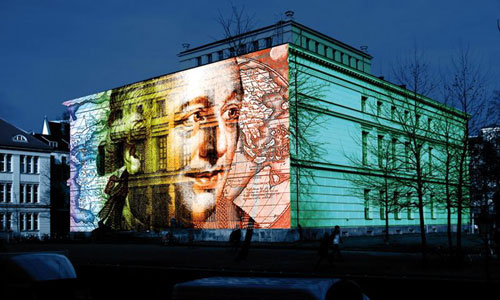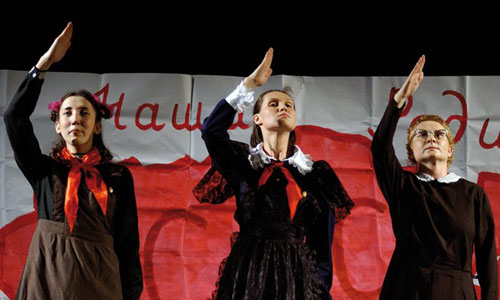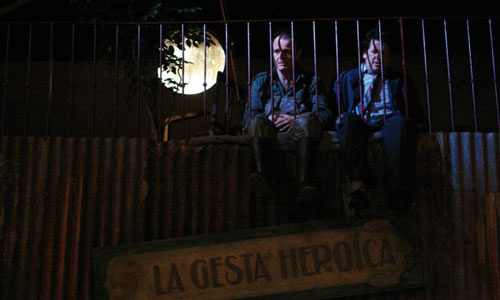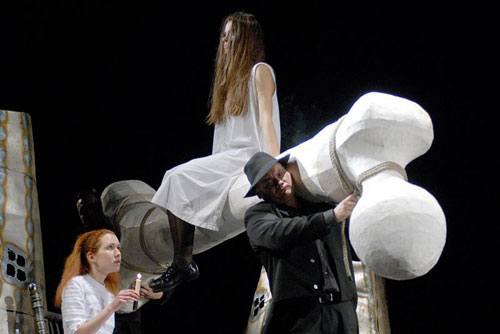|
From 19 June to 6 July, “Theater der Welt” (Theatre of the World), one of Germany’s most important international theatre festivals,
turned the German city of Halle/Saale into a center for modern theatre, presenting productions from all over the world.
Set up in 1981 by the German Centre of the International Theatre Institute (ITI), by analogy with the “Parisian Theatre of the Nations” and under the patronage of the UNESCO, the festival has offered for over twenty-five years a creative exchange between national and international contemporary theatre work.
Themed “Komm! Ins Offene” (Come! Come to the Unconfined!), an appeal by Hölderlin in his poem “Der Gang aufs Land” (Walk into the Countryside) against the „Leaden Times”, the festival presents international plays, dance theatre, musical theatre and puppet theatre—all performances of the festival are in native language with German subtitles—24 productions, 80 shows, 18 venues, among them the oldest German wooden theatre in Bad Lauchstädt, the garden empire Wörlitz, the Franckeschen Stiftungen and numerous locations at the shores of the river Saale and in the whole region, transforming an entire town into an open stage.
There is a lot of the “experimental” to be found at the festival.
Streets, squares, facades of buildings, the airport and the football stadium – all over the place artists involve the audience into the action

There were many good reasons for choosing Halle as festival venue, being the native town of composer George Frederic Handel, and the home to the Martin Luther University, founded in 1694.
In its more recent past, Halle was the centre of the East German chemical industry - which had far-reaching ecological, urban and social consequences, not least because of the decline of the industrial complexes after German reunification.
Problems and opportunities of this dramatic development pose a potential for theatre, for dialogue with the people. This is the first time this theatre festival, so rich in tradition, is being held in a town that is not so well-heeled.
Theater der Welt began as a biannual festival in 1981 and became a triennial event in 1993. Previous host cities include Berlin, Hamburg, Frankfurt, Munich, Cologne, Stuttgart and Dresden (1996) - the first host city in Eastern Germany.
“Things are going to be really different in Halle,” says program director Torsten Mass. The financing of the festival proved to be particularly difficult, the budget is only half the amount they had at their disposal in Stuttgart the last time and the audience has no real experience of international festivals. That is why the festival organisers were going for the “big names” – for classics from the realm of world drama and much sought-after highlights, like the production of Faust staged by the Lithuanian star director, Eimuntas Nekrošius.
“Presenting new aesthetic forms only makes sense if you have a solid basis,” as Mass says.
But not only live performances are on the program; the festival also presented in the pre-program “Filme der Welt” (Films of the World), which already began on Tuesday, 6th November 2007 with a film from Mali, “Bamako” that received the audience award “Rencontres Paris Cinéma” 2006, directed by Abderrahmane Sissako.
Other films shown were “Silent Waters” (Pakistan), directed by Sabiha Sumar, “Il Fare Politica” (Belgium), directed by Hugues Le Paige, “X (ics)” (Italy), a project by the group Motus (Rimini) and “The Bubble”, an event with short films from Israel by the directors Sigalit Liphshitz, Mihal Brezis’ & Oded Binnuns, David Ofeks, and Eytan Fox.
The highlight of the film presentations was however, without any doubt, “Notes towards an African Orestes” (Africa /Italy 1968-1973), directed by Pier Paolo Pasolini.
As early as 40 years ago, Pasolini seemed to despair about progressive ‘neo capitalism’ after having a good look at the mechanisms of authoritarian systems which destroy human and cultural otherness. His search for allies lead him into African countries. He opposed the loss of values to young African nations that discovered democracy just then. Pasolini compared the fate of Africa to the Greek mythology ( an archaic civilisation becomes democratic, just like the matricide in Aeschylus’ play). Pasolini commented and discussed his project with African students in Rome, travel led through Tanzania and Uganda, searched for film locations and performers. He recorded his “Notes towards an African Orestes” with a camera.
The directors Caden Manson and Jemma Nelson from the New York “Big Art Group” introduced the films as a starting point for their own production “The People."
Caden Manson and Jemma Nelson, the shooting stars of the New York scene,, revolutionised performance art since 1999. The stage becomes a film set, which represents the manipulation of the media world and the reality of TV: loud, shrill and political. In the language of the media an unfathomable game arises with the reality and the fiction smuggled in. Projections flow into each other, sequences are cut and information is put together randomly. To them, parallels can be found between Pasolini’s film and the town that hosts the festival.
To Pasolini, Africa had arrived in 1969 at the same turning point of its history like the ancient Argos in the time of Orestes. In 2008 the people of Halle are questioned about their opinion of democracy and cast as actors.
Apart from experimental art, there is also tradition in Halle.
For 200 years, the oldest and most famous family of puppeteers, the Ensemble Compagnia Marionettistica Carlo Colla & Figli, have brought their puppets to life. Their 250 original productions of the Milan Scala are cheered worldwide, the enchanting stage sets receive scene applause. Their 2000 marionettes reveal the preciousness of ancient workmanship. The Collas do not lead them with six silk threads but with up to forty to the most terrific tricks and most delicate movements. Their play “Excelsior”, is a fantastic choreography about the miracles of technology from the Panama Canal to the invention of the electricity. The two great powers light and darkness allegorically fight for the dominance and the achievements of civilisation, a duel which leads into the most far-flung corners of the world. This poetic hymn on "progress" was created in 1881 for the Milan World Exhibition for which participants arrived from all over the world. "Escalators/Interventions At The Public Space" was a "Supporting Art Project" of the ITI
The International Theatre Institute had invited four choreographers from the region to work out interventions with dancers in the public room . Starting points form the escalators of Halle’s department stores and the airport - structures giving strict directions, a challenge particularly for experiments of dance, the unusual and the non-daily. In connection with international renowned media artists, students of the Academy of Arts “Burg Giebichenstein”, another three universities, free artists from Halle and the artistic symposium “Mobility Visions/Bewegende Zukunft”, they question “escalators movement and control in the public room” - with the idea to discover new possibilities of performing movement.
Galina Pyanova founded the first open theatre group of Kazakhstan in 2002. With “Back in the USSR” they were “the heroes of Yerevan”; the Armenian festival rejoiced and celebrated them in the triumphal procession. This cheeky parody about growing up in the Soviet Union is based on improvisations. With a boisterous joke, three girlfriends move through socialism and its end. They fear, love and argue, share moments of luck. They practise kissing with Lenin busts, Western goods of the functionary’s daughter. These everyday stories from school and nursery times are combed through by a German journalist who rummages in the Soviet archives. The critics declared this production a perennial hit full of identification, created for the countries in which socialism did not win. The fans presented red pinks. A new version is played in Russian, English and German.

Ricardo Bartís, internationally celebrated director, author and actor, is the idol of innumerable open groups which process the horror of the dictatorship like he does. For 22 years he has memorialised the disappearance of 30,000 Argentines in absurd pictures, unwavering, like the mothers at the Plaza Del Mayo, who do solemn vigils every Thursday at exactly 4 pm for decades in memory of their lost fathers and sons. Stars fall from the sky in “La Pesca”, there is only a reflection, the reflection of their death..

Bock & Vincenzi’s experimental serial of “Invisible Dances” was awarded as one of the two best works of Great Britain in 2006. They analyse radical perception samples and room relations, like isolation - communication, consciousness - death, power - loss of control. Their picture and sound worlds fascinate and provoke. For 13 years they have been searching together with dancers and actors, blind and disabled performers, sound and video artists, programmers and philosophers. In the light of terror, safety laws and deceitful media, Vincenzi stages the reign of terror “Dr. Mabuse” with a lot of black humour.
Shakespeare’s King Lear becomes the opponent of the hypnotist, who loses control over his empire and himself. Truth, will and reality become insignificant, the unconscious takes possession of the ruler. The eight dancers and performers find out, furiously, whether we really should call for order in times of deep uncertainty.
With "The Silence of the Communists", Klaus Völker ties to the cheered productions of Luca Ronconis (Turin 2006) and Jean-Pierre Vincents (Avignon 2007). For the “Progetto Domani” Ronconi dramatised the correspondence of the labor unionist Vittorio Foa with the former Communists Miriam Mafai and Alfredo Reichlin ten years after the self-dissolution of the communist party of Italy with which once a third of the population sympathised. Why did the party which was decisive for the new beginning and democratisation process abruptly lose consent? The three prominent intellectuals reflect their experiences to face the questions of the future, the globalisation and the changed working world. Last year, Vincent’s French processing triggered a renewed discussion about the failure of the communism. Theater der Welt 2008 takes this spark to a town of former GDR. Will it also be transferred to the spectators?
Eimuntas Nekrošius, the great old master of the Lithuanian theatre, became world-famous with his Chekhov and Shakespeare productions. For the first time he dares a German classic: Goethe’s “Faust” and received the UBU award in 2008. He stages “Faust” as a modern tragedy of a relentless seeker and lets his hero wander through a fantastic surreal theatre landscape. Whatever Faust finds on his way, only the process is important, the search itself. The light magician Nekrošius starts on a deserted stage which constantly fills and changes. His visionary atmospheric pictures of colours, forms and music contrast the meagre but heavily symbolic equipment, the concrete fantastic scenes and the powerful acting of his ensemble he has worked with for three decades.

Yael Ronen, one of the most important and most provocative directors of Israel, is a megaphone of the young, war-weary, fun-loving generation. She writes her pieces in teamwork with Israeli and Arab actors, who capture ludicrous scenes near side and far side of the wall with the video camera and wrest furious humour from the everyday madness. She forces the audience and the ensemble to take positions of the opponents, exposes propaganda, names conflicts and investigates similarities. With “Plonter”, Ronen’s approach was resoundingly successful in 2007. In “Third Generation”, she analyses the Gordian knot that determines the German, Palestinian and Israeli people. The starting point is the path of life of three families, vicarious for the history of the three nations, between Berlin and Jaffa from 1939 to 1949. They meet once again 60 years later, this time in the third generation. How do they handle memories, questions of guilt, rejection, victimhood and delinquent?
Come! Come to the Unconfined! is the slogan of the festival and young artists ask “How open is the open?” What does it mean, to act in the open, public space? Which rules were set? Where is some room left to act?
An interesting project all together, no doubt. And still, I am missing something there in these, our “Leaden Times” and in the program of the “Theatre of the World”.
Everything appears a bit forced and technical, staged, planned with a purpose that maybe goes beyond the original festival idea?
Is it not so much art, theatre art, not even political theatre, but rather the attempt to present at any cost a new international image?
One of the directors was asked how he feels about the message of his play and how he thinks it contributes to the present German theatre audience and the German society in general. His answer was: “I don’t care! This is not my culture!”
It seems that coming to the unconfined is not that easy after all.
|

